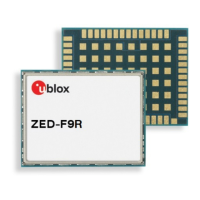ZED-F9R - Application note
UBX-22035176 - R01 Contents Page 6 of 30
C1-Public
1.1.3 Host system
Certain functionality in the setup needs to be implemented by a host system. This includes:
• Configuring the receiver
• Monitoring and debugging the receiver
• Providing odometer data to the receiver
• Providing correction data to the receiver
All of the above can be done in u-center, except for providing odometer data to the receiver. It is
recommended to start evaluating and developing the system with a PC running u-center as the main
host, and gradually move the functionality to an embedded host for the final product.
It is also strongly recommended to make monitoring and debugging the receiver possible in the final
product. To do this, design your system so that is it possible to connect to u-center directly to the
receiver. Alternatively, data logging may be implemented by the host to allow data analysis and
debugging.
1.1.4 Odometer data
Odometer data refers to information about the distance travelled by a vehicle. This information is
usually available from a vehicle either as wheel ticks or speed measurements. The data is typically
generated by sensors that can measure the rotation of the vehicle’s wheels, such as Hall effect
sensors. These sensors are often used in low-cost brushless DC motors utilized in typical robotic
applications.
Providing odometer data to the receiver is mandatory for high-precision sensor fusion. If odometer
data is not available from the vehicle, an external sensor must be attached to the vehicle for an
accurate assessment of achievable accuracy.
Odometer data can be supplied to the receiver either through dedicated hardware pins for wheel ticks
and direction, if the application type permits it, or through a serial interface as UBX-ESF-MEAS
messages.
1.1.5 Correction data
Correction data is another mandatory part for high-precision sensor fusion. Corrections allow the
receiver to measure its position more precisely by providing more information about the available
satellites. Correction data is available through dedicated services, such as u-blox PointPerfect, that
utilize dedicated software for obtaining the data. This data then is provided to the receiver through a
serial port.

